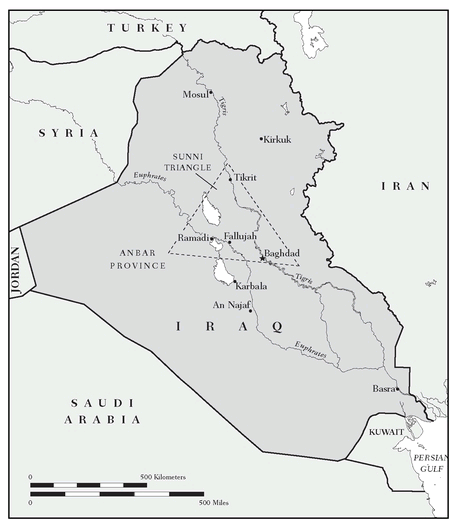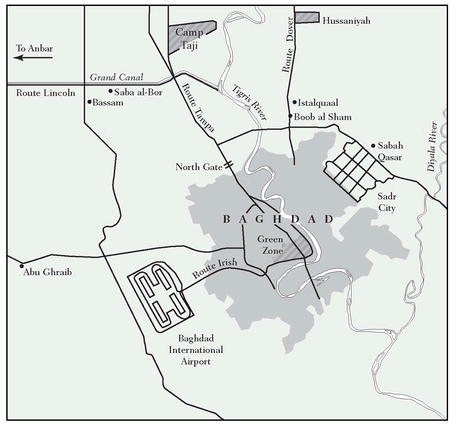Kaboom
Authors: Matthew Gallagher


Table of Contents
Â
Â
Â
Â
Â
Â
Â
AUTHOR'S NOTE:
What follows is a memoir, a personal account of my time and experiences in Iraq. It is to be read accordingly and not mistaken for a military unit's official history. Further, some names and some physical characteristics of persons depicted in this book have been altered, and in many cases nicknames have been utilized in lieu of the real names of soldiers I served with and Iraqis I encountered.

For my mother,
Deborah Scott Gallagher
Deborah Scott Gallagher

MAP OF IRAQ

MAP OF BAGHDAD AND SURROUNDING AREA
INTROLOGUE
“White 1, dis, uhh, White 2.”
Staff Sergeant Bulldog's deep Southern drawl crackled over the platoon radio net, stirring me out of my early-morning haze. Our senior scout's distinctively dry twang was laced with undertones.
Staff Sergeant Bulldog's deep Southern drawl crackled over the platoon radio net, stirring me out of my early-morning haze. Our senior scout's distinctively dry twang was laced with undertones.
“Send it, 2,” I responded.
“Dere's . . . well . . . I don't really know how to say this, so I'm just gonna say it. Dere's a dog at the car dat blew up last night. And he's licking at something, all crazylike. Prolly whatever's left.”
“Huh?” I was still fighting through sleep-deprived grogginess.
“Yep. My gunner's confirmed it. Da dog be eatin' Boss Johnson. Or at least what's left of him.”
Staff Sergeant Boondock's voice now boomeranged across the net, ringing with hysterics. “Holy fuck, Bulldog, this is straight mafia shit!” There was a brief pause, and then he continued. “Think I'll be able to bust Cultural Awareness out on one of the hajjis now?” he said, referring to the stun gun he carried
on his ammo rack. He hadn't yet found an opportunity to unleash it on anyone but bored soldiers back at the combat outpost, and we were all waiting for the day that some Iraqi did something to warrant its electric kiss. As was often the case, Staff Sergeant Boondock's words were as accurate as they were profane: This killing belonged in a Chicago mob war, circa 1929, not here, in whatever this was, circa February 2008.
on his ammo rack. He hadn't yet found an opportunity to unleash it on anyone but bored soldiers back at the combat outpost, and we were all waiting for the day that some Iraqi did something to warrant its electric kiss. As was often the case, Staff Sergeant Boondock's words were as accurate as they were profane: This killing belonged in a Chicago mob war, circa 1929, not here, in whatever this was, circa February 2008.
We had moved out of the combat outpost to conduct an area reconnaissance in a neighborhood where a local sheikâthe aforementioned Boss Johnson, nicknamed like everyone else around here to keep the litany of individuals straight and to avoid butchering Arabic names with American tonguesâhad been blown up the night before. Armored military vehicles were damaged, and occasionally destroyed, by improvised explosive devices (IEDs), rockets, and mortar rounds. Human beings in shabby, fake Mercedes targeted for a hit job with such weapons got catastrophically mutilated into flesh soup.
Our principal mission for the day was to engage the local populace, attempt to prevent acts of reprisal between the Sunnis and the Shias, and learn if anyone would let us taciturn Americans in on who or what was responsible for this murder. Had it been a cell of foreign al-Qaeda terrorists? A renegade band of insurgents aligned with the Jaish al-Mahdi (JAM) paramilitary? Another prayer bead on the death string of tribal warfare? Or had it been just another act of personal retribution, free of any grandiose political or social statements? Questions, always more questions, I thought. Never enough answers. The real problem was that in the eight hours since the explosionâso loud that our security elements at the outpost miles away had heard itânot one local individual had dared venture onto the street. This, coupled with a morning wind racing in from the south and a pale desert glow shaping the village, sparked in my mind cinematic imagery of the strutting cowboy posse, unaware of how much red needed to run before the movie could end.
After all, I thought, every good story has a climax. Even the true ones.
With the local population either unable or unwilling to help us complete our primary task and purpose, I decided to turn to our secondary mission for this patrol: information operations. We dismounted from our vehicles and poured into the trash-ridden streets and alleys of our provisional home, a village fractured by the sectarian divide in the northern limits of Baghdad Province. The locals called it Saba al-Bor. My men facetiously referred to it as Paradise. We put up posters and leaflets that stressed peace and cooperation and urged the local population to avoid the temptations of religious violence. That was Higher's great fear: Boss Johnson's death could possibly
augment the rift between Sunnis and Shias that already sometimes degenerated into late-night shoot-outs between rival Sons of Iraq checkpoint groups, also known by their Arabic name of Sahwa and more accurately described as security gangs paid by Coalition forces. The propensity of the Iraqi police (IP) and the Iraqi army (IA) to do the same only exacerbated the incessant effort for one quiet night without violence, an objective that would likely become more unobtainable come spring when the fair-weather fighters returned.
augment the rift between Sunnis and Shias that already sometimes degenerated into late-night shoot-outs between rival Sons of Iraq checkpoint groups, also known by their Arabic name of Sahwa and more accurately described as security gangs paid by Coalition forces. The propensity of the Iraqi police (IP) and the Iraqi army (IA) to do the same only exacerbated the incessant effort for one quiet night without violence, an objective that would likely become more unobtainable come spring when the fair-weather fighters returned.
The threat of civil war still loomed over Iraq like the ghost of an heiress bride killed on her honeymoon, haunting the lover who murdered her. And although all of the words on the handouts were written in Arabic, it was fairly simple to decipher the messages being put out. The one with a very alive and very happy Boss Johnson standing next to the Iraqi flag, with his arm around other Sahwa leaders, proved to be my soldiers' favorite.
“This one says, âFigure out which one of these bastards killed me, and you can have the billions of dinar buried underneath my house!'” Specialist Flashback cracked, as he plastered a poster onto the side of a falafel shop.
“That's pretty funny,” Sergeant Axel said. “Mine says, âAt least the guy from
Scarface
got to die with a mountain of cocaine on his desk. All I got was this lousy tee shirt.'”
Scarface
got to die with a mountain of cocaine on his desk. All I got was this lousy tee shirt.'”
The platoon roared in approval. “Stay on task!” Sergeant First Class (SFC) Big Country yelled, but by the inflection in his voice, I knew that the soldiers' imitations had amused our platoon sergeant. He was just too professional to let them know that.
As we finished up the operation and prepped for a loudspeaker broadcast to be transmitted from the back of one of our armored Stryker vehicles, Private First Class (PFC) Cold-Cuts strolled up next to me.
“LT [lieutenant] G . . . I feel kind of weird.”
“What's up?” This was nothing out of the ordinary; PFC Cold-Cuts wore his emotions on both sleeves and had looked sheepish ever since we rolled out into sector.
“I don't know, sir, he's . . . dead, you know?”
I nodded my head, conscious of where he was heading with this. I, myself, had been surprised that I felt no horror when I saw the remnants of the car and of Boss Johnson, even if his larger pieces had already been scooped up into locals' pots and pans for burial in the immediate aftermath of the car bombing. I doubted anyone ever got used to the sight of intestine bits hanging like Christmas ornaments from tree branches, but I hadn't felt compelled
to express an emotion of any kind, really. There was just a nothingness, an acknowledgment of fact, an observation that my immediate environment had been altered slightly and had the potential to spiral into something more complex.
to express an emotion of any kind, really. There was just a nothingness, an acknowledgment of fact, an observation that my immediate environment had been altered slightly and had the potential to spiral into something more complex.
Other books
My Super Sweet Sixteenth Century by Harris, Rachel
Finn's Golem by Gregg Taylor
The Mommy Miracle by Lilian Darcy
Enemy of Mine by Red L. Jameson
The Reluctant Nude by Meg Maguire
Wind in the Wires by Joy Dettman
Andersen, Kurt by True Believers
Camilla by Madeleine L'engle
Heart of Fire by Carter, Dawn
Resisting Her Rebel Hero by Lucy Ryder